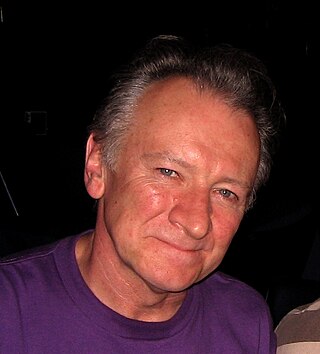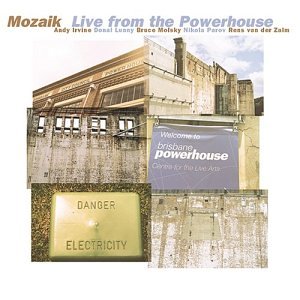William Michael Joseph Whelan is an Irish composer and musician. He is best known for composing a piece for the interval of the 1994 Eurovision Song Contest. The result, "Riverdance", was a seven-minute piece of original music accompanying a new take on traditional Irish dancing that became a full-length stage production and spawned a worldwide craze for Irish music and dance. The corresponding soundtrack album earned him a Grammy. "Riverdance" was released as a single in 1994, credited to "Bill Whelan and Anúna featuring the RTÉ Concert Orchestra". It reached number one in Ireland for 18 weeks and number nine in the UK. The album of the same title reached number 31 in the album charts in 1995.
Planxty were an Irish folk music band formed in January 1972, consisting initially of Christy Moore, Andy Irvine, Dónal Lunny, and Liam O'Flynn. They transformed and popularized Irish folk music, touring and recording to great acclaim.

The music of Bulgaria refers to all forms of music associated with the country of Bulgaria, including classical, folk, popular music, and other forms.
Riverdance is a theatrical show that consists mainly of traditional Irish music and dance. With a score composed by Bill Whelan, it originated as an interval act during the Eurovision Song Contest 1994, featuring Irish dancing champions Jean Butler, Michael Flatley and the vocal ensemble Anúna. Shortly afterwards, husband and wife production team John McColgan and Moya Doherty expanded it into a stage show, which opened in Dublin on 9 February 1995. Since then, the show has visited over 450 venues worldwide and been seen by over 25 million people, making it one of the most successful dance productions in the world.

Andrew Kennedy Irvine is an Irish folk musician, singer-songwriter, and a founding member of Sweeney's Men, Planxty, Patrick Street, Mozaik, LAPD and Usher's Island. He also featured in duos, with Dónal Lunny, Paul Brady, Mick Hanly, Dick Gaughan, Rens van der Zalm, and Luke Plumb. Irvine plays the mandolin, mandola, bouzouki, harmonica, and hurdy-gurdy.

Davy Spillane is an Irish musician, songwriter and a player of uilleann pipes and low whistle.

Dónal Lunny is an Irish folk musician and producer. He plays guitar and bouzouki, as well as keyboards and bodhrán. As a founding member of popular bands Planxty, The Bothy Band, Moving Hearts, Coolfin, Mozaik, LAPD, and Usher's Island, he has been at the forefront of the renaissance of Irish traditional music for over five decades.

Cold Blow and the Rainy Night is the third album by the Irish folk group Planxty. It was recorded in Sarm Studios, Whitechapel, London during August 1974 and released the same year. It takes its title from the third song on the album, "Cold Blow and the Rainy Night".
An east wind is a wind that originates in the east and blows west.
Tara Music has been regarded for many years as one of the leading traditional Irish music recording companies. The label was set up by Jack Fitzgerald and John Cook in the early 1970s.

After The Break is the fourth studio album by the Irish folk music band Planxty, recorded at Windmill Lane Studios from 18 to 30 June 1979 and released the same year. It was the band's first of two releases on Tara Records.

Way Out Yonder is an album by Andy Irvine, recorded between July and December 1999 and released in January 2000. It was co-produced by Irvine and Steve Cooney.

Rainy Sundays... Windy Dreams is Andy Irvine's first solo album, produced by Dónal Lunny and recorded at Dublin's Windmill Lane Studios in late 1979. It was released in January 1980 by Tara Records.

Live from the Powerhouse is an album rehearsed in six days, starting on 1 March 2002 in the seaside town of Rye, Victoria in Australia, by multicultural group Mozaik featuring Andy Irvine, Dónal Lunny, Bruce Molsky, Nikola Parov and Rens van der Zalm.

Changing Trains is the first studio album recorded by Mozaik in Budapest during November 2005, and for which they had rehearsed new material a few months earlier, in January and April.
Andy Irvine & Dónal Lunny's Mozaik [a.k.a.Mozaik] is a multicultural folk band consisting of Andy Irvine, Dónal Lunny, Bruce Molsky, Nikola Parov and Rens van der Zalm. Created in 2002, the band have toured Australia, Europe, USA and Japan, and recorded four albums.

Andy Irvine/70th Birthday Concert at Vicar St 2012 is a live recording of a pair of concerts held at Dublin's Vicar Street venue, on 16 and 17 June 2012, to celebrate Andy Irvine's 70th birthday.

Rude Awakening is Andy Irvine's second solo album, recorded in December 1990 and January 1991 at Westland and Ringsend Studios, Dublin and Frank MacNamara's Park Studio, County Meath, and released in 1991 on Green Linnet Records.
Declan Masterson is an Irish uilleann piper, traditional musician, composer and arranger. In addition to pursuing a solo career and playing with Moving Hearts and Patrick Street, Masterson was one of the Riverdance musicians.

Between the Jigs and the Reels: A Retrospective is a two-disc anthology by the Irish folk band Planxty. It includes a 17-track CD and a 36-track DVD with over two hours of previously unreleased footage (1972–1982) from RTÉ archives.













